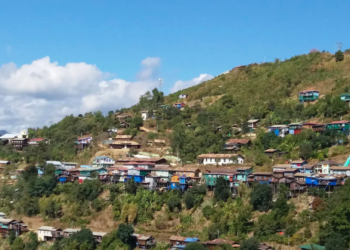Thukhamein Hlaing (b. 1948) is a giant of contemporary Burmese poetry. Along with Aung Cheimt, and several others, he revolutionized modern Burmese poetry by freeing it from the restrictions of traditional rhyme. A modest gentleman, you would never know he is also famous in Myanmar as a songwriter, specializing in writing Burmese lyrics for international pop songs.
When did you start writing poetry?
I started writing poems in 1965. Someone once asked me why I write poetry. I answered: “because I want to.” I think it’s a good enough answer. I became convinced – certain inside my heart – that I want to devote myself to writing poetry in 1966. I could no longer resist the pull of poetry and so I quit high school in 1966. It’s more like a conviction than a realization, mixed with a pride, when I say I am complete only with poetry. Since then, I just wanted to write poems all the time. I didn’t even want to give time to eat, sleep, or take a bath. I wanted to write all the time, so that even ‘the time to write’ is missing.
I was eighteen years old in 1966. My surroundings and this world were more influential for me, more than love. The Vietnam War, political affairs of my country, money, and power, other world affairs, matters of life and death.
When I was starting out as a poet, I found I could not capture all these influences and feelings well with the traditional four-syllable format of classical Burmese poetry. As for my thoughts, my worries, my feelings about writing poetry, the best answer to these questions is found in my poetry itself.
What are your thoughts on the poet’s role in society?
I don’t want to use the word “thought”. Rather, I prefer to call it my “belief”. “If everyone knew poetry, nobody would get into any trouble in this world.” That is my belief about poetry’s place in our society. My remarks are of course colored by Myanmar’s history. Even before our country’s independence in 1948, even before General Aung San [the founder of modern Myanmar] was assassinated, the prominent politicians of the day had already adopted a political culture of destroying one another – of constant infighting, intrigue and betrayal. In 1975, in my tenth year of being a poet, I chose not to take part in that kind of annihilation politics. Instead, I chose a politics that takes responsibility through poetry.
Again, the answer to this question is best answered by my poetry. For example this two-line poem of mine – that does not even have a title:
I’ve come to a world I can’t help much
I’ve strived as much as I can
Today, the world can see my country’s politics.
Here in this country, we can publish no more than 500 copies of any one book of poetry – no one buys them. How are we even strong enough to survive? This question is also a necessary answer.
In the end, I prefer to answer through poetry. So here is another poem I wrote on the twenty-third of September 2016 – and I must emphasize that I wrote it before Bob Dylan got the Nobel Prize for literature.
The Prize
Hey, you poet,
What prize did you get?
Me? I got the world.
I’ve got the world that you’ve got.
Authors’ Note: These interviews are excerpted from Burma Storybook, a poetry and photography book inspired by the documentary film of the same name, produced by Corinne van Egeraat and directed by Petr Lom.
The English language hardcover edition of the book is for sale at Hla Day, Innwa Bookstore, Myanmar Book Center and the Strand Hotel.
A Burmese language-only paperback edition of the book is for sale through Yangon Book Plaza.
There will be a Free Open Air Screening of the Burma Storybook documentary film (82 min.) in Mahabandoola Park in Yangon on November 25 at 6 p.m. From Nov. 25 to Dec. 4, you can visit the interactive Burma Storybook Photo Exhibit at the Tourism Burma Building.
For more information: www.burmastorybook.com

















